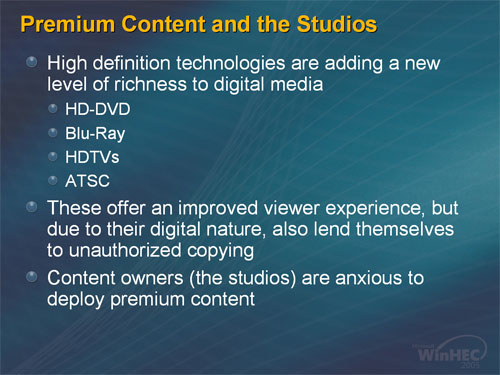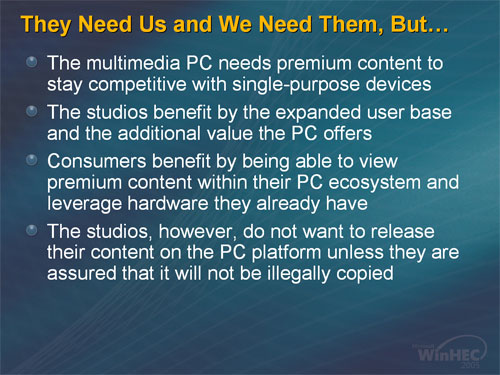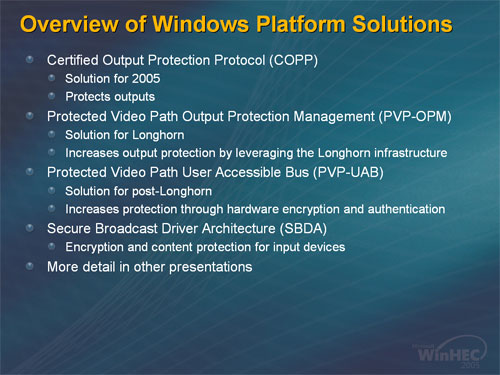WinHEC 2005: Day 2
by Derek Wilson & Jarred Walton on April 27, 2005 8:45 AM EST- Posted in
- Trade Shows
Digital Media Content Protection
In order to gain traction as a home entertainment device, the industry is being forced to support various forms of content protection. ATI gave a presentation on the subject, discussing the costs, benefits, and requirements of content protection. The presentation was certainly one of the more entertaining events so far, if not for the usual reasons. First, let's talk about why we "need" content protection.

The basic reason for protecting content is that new digital versions are enabling the reproduction and distribution of high quality copies. While in the past there was often a degradation of quality by making an analog copy of a movie or song - or a copy of a copy to the nth level - digital content can be reproduced indefinitely with no loss in quality. Since all users are naturally thieves and pirates, no one will ever pay for content again, right? Sarcasm aside, that seems to be the attitude of the content providers. However, due to the large installed user base, it is becoming difficult to ignore the PC as a multimedia platform.

This slide basically summarizes the situation. The content creators want to expand their user base. Meanwhile, the consumers want to be able to use the content which they have purchased as well as any hardware they have in whatever way they see fit. For example, the consumer may wish to place a song they have purchased on a CD for use in a car, or on an MP3 player for jogging. Consumers also want to save money, i.e. buy a single multi-function device like a PC rather than purchasing several single-function devices. These goals are in conflict with each other, unfortunately, and this has been a hot topic of debate over the past several years: consumer fair-use rights vs. copyright holder rights.

As the presentation progressed, ATI discussed the technical solutions that are being developed to ensure that the PC can continue to grow as a multimedia platform. Microsoft is working with vendors to create increasing levels of content protection, which will be rolled out over the coming years. We would say that past experiences such as the breaking of DeCSS - which is a major part of what has brought us to the current stalemate - have created a certain amount of paranoia with the content providers. It's difficult to say whether the above solutions will truly be sufficient, or if they are merely meant as a token effort to combat piracy and lull the content providers into a false sense of security. After all, anything that must eventually be shown in an unencrypted format can be captured at that point; we would say it's simply a matter of time before some of the new encryption schemes are bypassed by the ne'er-do-wells of the world.
The audience reaction to the presentation was decidedly unenthusiastic. The hardware vendors don't seem to like the idea of spending more money on their designs and the consumers don't want to be limited in how they use the products they purchase. Several people approached the microphone to ask critical questions and/or make disparaging comments on the situation, and they were greeted with applause from many of the other attendees. We got the distinct impression that while the hardware vendors were afraid to publicly speak out for fear of being cut off, they would all really prefer to avoid doing extra work which will likely prove futile.
If we take a broad look at the market, TV, movies, and music have been around for decades without real encryption or protection, and yet consumers continue to spend money on them. Fair Use rights such as the ability to make a backup copy or convert a product to a different medium have not yet killed off the content providers. In fact, some would argue that new technologies such as MP3s have only increased the number of people hearing and purchasing content.
There will always be those that try to get something for free where possible, but many people are only looking to pay a reasonable price for a reasonable product. If the RIAA had hurried to create solutions such as iTunes rather than waging a legal war against Napster and the other file-sharing services, they may have saved themselves time and money. Those who fail to learn from the past are condemned to repeat it, unfortunately. For better or for worse, content protection appears to be a large part of the future of digital entertainment.










22 Comments
View All Comments
JarredWalton - Wednesday, April 27, 2005 - link
Going along with what Derek said but in a different vein, let's say the technology industries spend billions of dollars on a system that appears to be safe in order to please the content providers. When the system still ends up being cracked/hacked/bypassed (which I feel is inevitable), why bother in the first place? DeCSS has been cracked for years. Why is MS talking about layers of protection over the coming years? Because they already assume/know that the earlier efforts will be bypassed!Have the sales of DVDs suddenly plummeted because people can create their own illegal copies? Why doesn't everyone just download the content off the Internet and burn it to a 25 cent DVD? Maybe it's just that it's too difficult and time consuming? The large retail outlets like Wal-Mart and Target however are selling more DVDs than ever - at slightly lower prices than before. It's a case of supply and demand, and I just don't think there are that many people looking to steal content. They want a fair price, and $20 for a $1 item is probably too high.
I also don't think a lot of people like paying the RIAA and MPAA a large amount of money when the artist gets practically nothing. Or purchasing a $15 CD for the one track on the CD that's worth listening to. That's a different story, though.
DerekWilson - Wednesday, April 27, 2005 - link
To quote #7: "...and everyone and their grandma are perfectly happy to never purchase "content" again.""We've seen what happens when the barriers to theft get drastically lowered, and what happens is the providers take it in the ass. "
This is absolutely untrue. Remember those decreased sales the RIAA reported? They were decreased units shipped to retail outlets (who are carrying less now that online retail is taking off). Point of sale numbers for the record industry has been record setting recently -- even during their reported downturn. It is also a very flawed system to report a free download as the loss of a sale. I can't even begin to count the ways this is illogical.
The argument is easily made (and always glossed over) that high availability of free content increases sales of the very same. There are hundreds of reasons this is true, but I'll keep this short and just point to the numbers: the RIAA has been doing better than ever since Napster came along with multiple landmark years for high record sales.
I have no doubt that we would see increased sales if iTunes and Napster dropped DRM. And not because people want to pirate the songs and resell them.
Which brings me to a point. The only people content providers should go after are the pirates who *sell* content for which they do not own the copyright. The mistake the RIAA and MPAA make is to think the average person is as greedy as they are.
But regardless of these facts, even if freely available content hurt the content providers, they have no right to limit the rights of everyone in order to eliminate the illegal activity of a vast minority of for profiet pirates (who are the only ones the content provider should have a real claim against). We don't remove knives from the kitchen because they can be used to kill. It is absurd to think that we need to eliminate all vehicles for possible illegal activity when legal functional and important uses of the same are abundant.
Legally, making personal copies of copyrighted material is appropriate. I would really like to have backup copies of my content in order to perserve the content that I purchased. I would rather store my movies on my computer after having bought them on phsycial media so that I can keep the disk elsewhere in case of a crash. Or it would be nice to burn electronically purhcased media to something physical for the same purpose. But content providers make this impossible because they simply do not understand the market.
And it's not even most artists that take up the cause of DRM and copy protection ... it's the beurocracy that makes money by simply facilitating the distribution of the content.
I don't have a problem with content providers making money. I'd like to see them make more. That's why I want them to drop the copy protection and DRM nonsense and start just selling content to a market that is so thirsty for it they have taken matters into their own hands.
TheGee - Wednesday, April 27, 2005 - link
Can Iwatch TV dad? Hang on while I go through the menu system to set it up for you whilst I play these tunes in the bathroom record that HDTV program to hard disk. Save that film on the DVD brecorder and.........f*ck whats that blue screen for?Turin39789 - Wednesday, April 27, 2005 - link
#7 a law that is unenforceable is not a legitimate lawBrian23 - Wednesday, April 27, 2005 - link
If Longhorn has media protection in it, I won't use it. Period. And that's not because I use illegal downloads. I just don't want someone to tell me I can't rip my CD and play it back on my iRiver.Poser - Wednesday, April 27, 2005 - link
My personal experience is that most consumers don't really give a damn about the interests of the content providers and are, when the opportunity exists, unapologetic theives. Remove limits on content access (via the 'net), limits on quality (via digital copying), and limits from technical ability (via easy to use programs), and everyone and their grandma are perfectly happy to never purchase "content" again.I'm continually surprised to see content providers so maligned for trying to protect their material from copying. We've seen what happens when the barriers to theft get drastically lowered, and what happens is the providers take it in the ass.
The existence of iTunes isn't proof that people "want" to pay for content, it's evidence that people really like easy to use software with slick functionality. And maybe even proof that lawsuits really do scare people into taking the legal route. If an illegal but free version of iTunes existed with the same ease-of-use, speed, iPod integration, availability to the clueless masses, and if on top of that there were no threats of legal recourse -- how popular would the legal, pay-per-song version be?
ElFenix - Wednesday, April 27, 2005 - link
that alphastation was ridiculously faster and less expensive than the 486 server, and yet alpha died. RIP alphaProviaFan - Wednesday, April 27, 2005 - link
Thanks for the article!This content protection BS is making me seriously consider other software (and possibly hardware) platforms. While Linux would be ok for most of what I do, it lacks a bit on the digital imaging side (no easy, fast, and reliable way to run the latest version of Photoshop). Does anyone know what Apple's stance on hardware content "protection" is?
DerekBaker - Wednesday, April 27, 2005 - link
106MB hard disk?LoneWolf15 - Wednesday, April 27, 2005 - link
Man, those old systems really take me back.I used to call that Acer Aspire case "what happened when an Acer engineer had too many beers while watching Apollo 13 one weekend". I also remember drooling over the Compaq P90 desktop when that came out, and when that SystemPro 486 was top-end hardware.
Thanks for the memories. Reminds me of the first system I actually built rather than bought (386DX/20MHz with a whopping huge 8MB of RAM and 106GB hard disk).